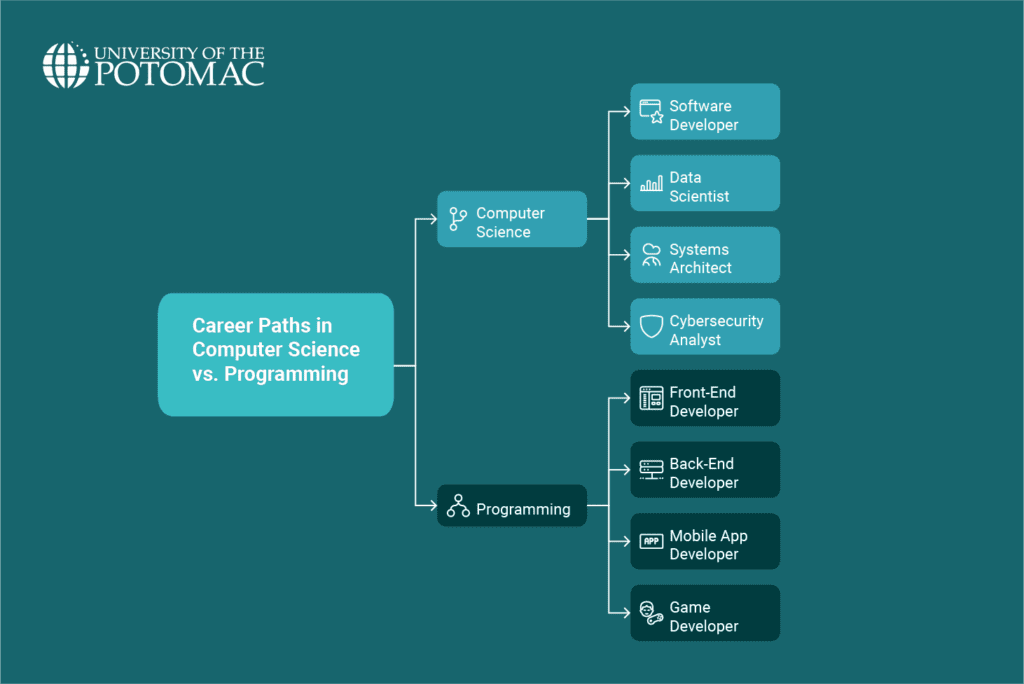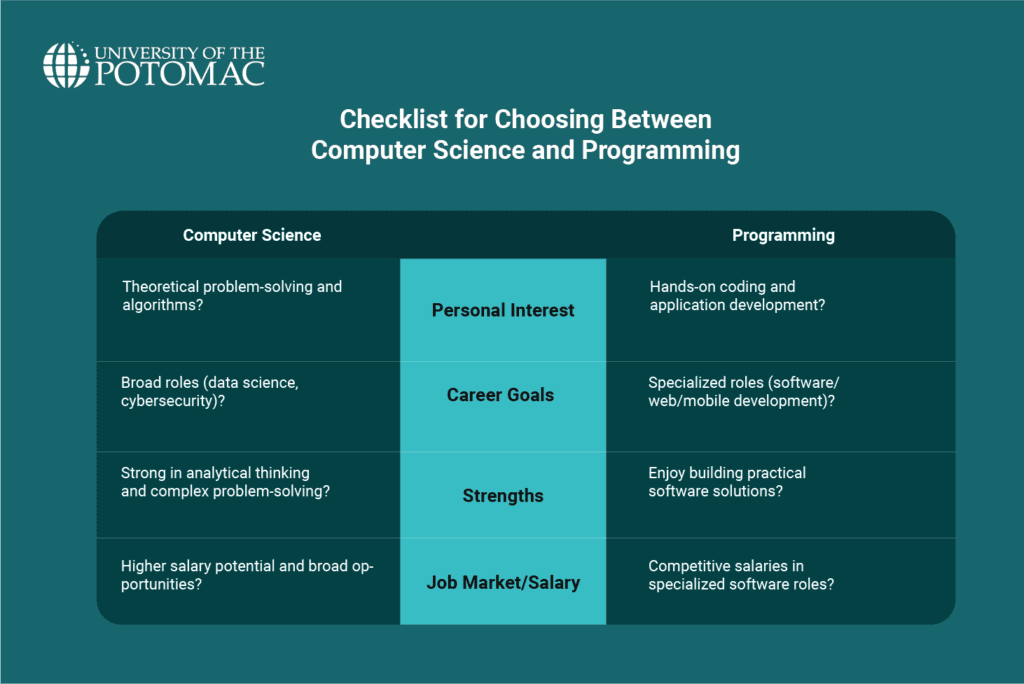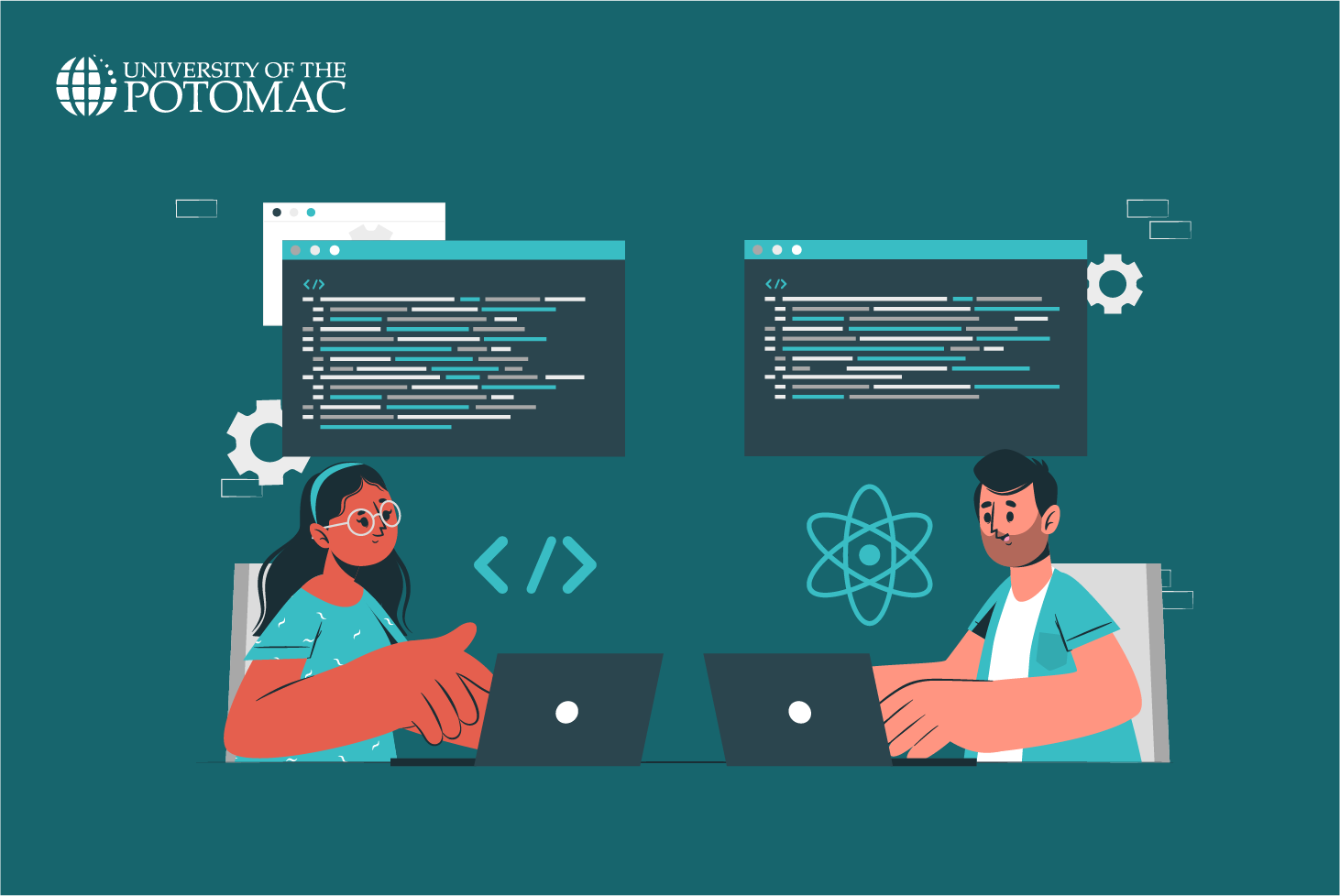Key Takeaways
- Computer scientists typically pursue advanced degrees for specialized fields, while programmers can enter the field through degrees or coding boot camps.
- Both fields offer various career paths, but computer scientists tend to work on research and system design, whereas programmers focus on application development and coding.
- Salaries for computer science and programming have grown due to high demand in tech, with computer science roles often commanding higher wages, especially in specialized areas like AI and data science.
Both computer science and computer programming are essential for shaping innovation and influencing how technology advances in the future. While computer science is more focused on understanding the theory behind systems, algorithms, and data, computer programming is primarily concerned with writing code and developing software.
Although the two fields are closely connected, their areas of study are different. Understanding computer science vs. computer programming differences can help anybody contemplating a career in technology pick the one that best fits their interests and career goals.
What Is Computer Science?
The study of computers and how they function is known as computer science, and it emphasizes both theory and real-world applications to develop and advance technology. It includes designing algorithms to solve problems, creating systems that learn and adapt (artificial intelligence), building and testing software, and protecting computers from cyber threats.
Computer scientists also handle large amounts of data, make user-friendly technology, and create visuals like graphics and 3D models. Their work affects sectors, including healthcare, banking, and entertainment, by tackling issues like making technology smarter, safer, and more efficient.
What Is Computer Programming?
Computer programming refers to using languages like Python, Java, or C++ to write instructions that computers can follow to complete tasks. Development of software tools, programs, websites, and games involves writing, testing, fixing, and updating code. Front-end developers focus on the parts of software that users see and interact with, whereas back-end developers work on the back-end components, such as servers and databases.
Programming also includes the creation of mobile applications, system software, and task automation technologies. Programmers make sure their code works correctly, is easy to use, and solves problems effectively by working closely with other team members, making their role key to building the technology we use every day.
Computer Science vs. Computer Programming
There are similarities between computer programming and computer science in areas like software development, algorithm design, and problem-solving, all of which contribute to the development and advancement of technology. But they have different areas of focus.
Developing, testing, and maintaining the code that drives these systems is the core focus of computer programming, whereas computer science is a broader field that examines the theoretical foundations of computing, software, and systems. Below, we’ll discuss the differences between these fields in terms of roles and responsibilities, education, skills, career paths, and salary outlook.
Roles and responsibilities
Programmers and computer scientists have quite diverse roles and concentrate on various aspects of technology.
Computer scientists study the theory and principles of computers. Artificial intelligence, algorithms, and improving system efficacy and security are their main areas of focus. They must do research, design systems, and devise innovative solutions to problems. Additionally, they study fields like encryption and machine learning.
During the first stages of a project, computer scientists design and plan the technology’s functionality and often collaborate with other experts to make their ideas a reality.
Programmers, on the other hand, are in charge of creating, evaluating, and repairing the code that powers software. These professionals turn computer scientists’ ideas into working programs. They develop and fix code using coding languages like Python or Java to ensure that everything functions properly. They also update and fix software to solve problems or meet new needs. Every day, they work on things like websites, mobile apps, and other tools, focusing on making ideas useful for people.
In essence, programmers are more concerned with building code and making sure it works, whereas computer scientists concentrate on high-level ideas and long-term planning. Computer scientists lay the groundwork, and programmers bring it to fruition.
Education
Computer scientists typically need a bachelor’s degree in computer science or a related field. Many people also pursue master’s or doctorate degrees to specialize in artificial intelligence or cybersecurity. A doctorate is recommended for those who want to teach or do research.
To obtain these degrees, students take courses in subjects like software engineering, data structures, and algorithms, but they also do research projects or internships to get practical experience.
To further develop their skills, computer scientists can enroll in specialized training courses and acquire certifications in areas like cybersecurity or machine learning.
Programmers often have a bachelor’s degree in computer science or software engineering, but there are other ways to enter the field, such as through coding boot camps or online courses. These boot camps are shorter programs that teach specific programming languages and skills in just a few months.
Programmers can also earn certifications from companies like Microsoft or Google to show their expertise in particular technologies, like web development or mobile app development. These certifications help programmers demonstrate their skills in certain areas and improve their job opportunities.
Both fields require ongoing learning because technology is always changing. Computer scientists often earn advanced degrees and certifications to stay up-to-date, while programmers regularly improve their skills through certifications, coding boot camps, or self-study.
Skills
Computer scientists must be skilled at the following:
- Problem-solving: The ability to figure out solutions to complex problems. Computer scientists use this skill to create systems and algorithms that help solve real-world issues.
- Systems design: Designing large software or hardware systems that function well together.
- Mathematical skills: Logic and statistics, in particular, are important for building algorithms and understanding complex problems.
- Research: Computer scientists often conduct research to explore new technologies or ideas and improve existing systems.
- Artificial intelligence & machine learning: Knowing how to create systems that can learn and adjust on their own to provide smarter solutions.
Meanwhile, computer programmers are usually proficient in:
- Coding languages: Knowing how to write code in programming languages like Java, Python, or C++ to build software and applications.
- Debugging: The ability to find and fix problems or errors in code to make sure it works properly.
- Software development: Understanding how to create software from start to finish, including planning, coding, testing, and launching.
- Version control: Using tools like Git to keep track of changes in the code and work with other team members.
- Problem-solving: Being able to come up with creative solutions to challenges in coding and software development.
- Collaboration: Working well with others on a team to build software, communicate ideas, and solve problems together.
Career paths

Given their specialized knowledge and areas of interest, computer scientists and programmers have distinct job opportunities in addition to certain common ones.
Typical computer science roles include:
Interested in pursuing a degree?
Fill out the form and get all admission information you need regarding your chosen program.
This will only take a moment.
Message Received!
Thank you for reaching out to us. We will review your message and get right back to you within 24 hours.
If there is an urgent matter and you need to speak to someone immediately you can call at the following phone number:
- We value your privacy.
- Software developer: Both computer scientists and programmers can work as software developers, designing and building applications, software, and systems.
- Data scientist: A career for those who analyze large sets of data to uncover patterns, trends, and insights using programming skills and knowledge of algorithms.
- Systems architect: Involves designing the structure of software systems, ensuring that all components work together efficiently.
- Cybersecurity analyst: Both fields can lead to careers in protecting computer systems from cyber threats and ensuring data security.
On the other hand, common programming careers include:
- Front-end developer: Specializes in the user-facing side of applications, working on the design and functionality of websites or apps that users interact with.
- Back-end developer: Focuses on the server side of applications, handling databases, server logic, and API (Application Programming Interface) integration to support front-end functionality.
- Mobile app developer: Works specifically on building applications for mobile devices using languages and frameworks like Swift or Kotlin.
- Game developer: Programmers can specialize in designing and coding video games, working with graphics, sound, and interactivity.
Ultimately, both fields are versatile. While computer scientists often pursue roles that involve deeper research and system-level design, programmers focus more on coding and building applications.
Salary and job outlook
Over the years, salaries for both computer scientists and programmers have increased because of the growing need for technology experts. Computer scientists, especially those skilled in areas like artificial intelligence and data science, have seen higher pay as businesses use more advanced technology. Programmers have also seen good salary growth due to the high demand for web, mobile app, and game developers.
In the future, wages for both fields are expected to keep rising as technology becomes more important in every industry. With more businesses relying on AI, automation, and data solutions, there will be even more demand for skilled professionals, ensuring strong job opportunities and career growth in the tech industry.
Choose Between Computer Science and Computer Programming

Choosing between computer science and computer programming can be tough, but considering a few important factors can help you make the right choice. Here are the main things to think about:
Personal interests
Think about what you enjoy doing. If you like solving big problems, understanding complex ideas, and working on system designs, computer science might be the right choice. But, if you prefer writing code, building apps, and seeing results quickly, computer programming could be a better fit.
Career goals
Your career goals are important. Computer science offers jobs in research, artificial intelligence, and system design, which often require a deep understanding of theories and concepts. If you want to work in those areas, computer science may be the way to go. But if you want to build software, websites, or apps, a degree in computer programming will give you the skills you need for that career.
Strengths and weaknesses
Think about your own strengths. Computer science professionals are good at logical thinking, math, and solving abstract problems, while programmers must deal with hands-on tasks, writing code, and fixing bugs.
Job market and salary
Both degrees offer good job prospects, but the job roles and salaries can differ. Computer science grads often earn more, especially in areas like data science and cybersecurity. But computer programmers are also in high demand, with good salaries in fields like web development and mobile apps. It’s a good idea to research the job market and salary trends in your area to help you decide which path might offer better opportunities.
The Bottom Line
To sum up, when choosing between computer science and computer programming, students should think about their interests, career goals, strengths, and job opportunities. Computer science is a great choice for those who enjoy solving big problems and working on complex ideas, while programming is better for those who like coding and building software. It’s also important to look at job options and salaries in each field.
At Potomac, we offer specialized programs designed to help you build a strong foundation in either computer science or programming.
Frequently Asked Questions (FAQs)
Which one is better, computer science or computer programming?
The choice between computer science and computer programming depends on your interests and career goals, as computer science focuses on theory and system design, while programming emphasizes coding and software development.
Can you be a programmer with a computer science degree?
Yes, a computer science degree provides the foundational knowledge needed to become a programmer, as it covers coding and software development principles.










